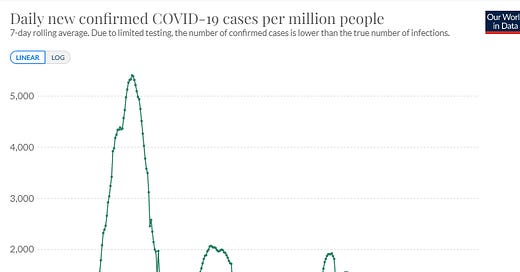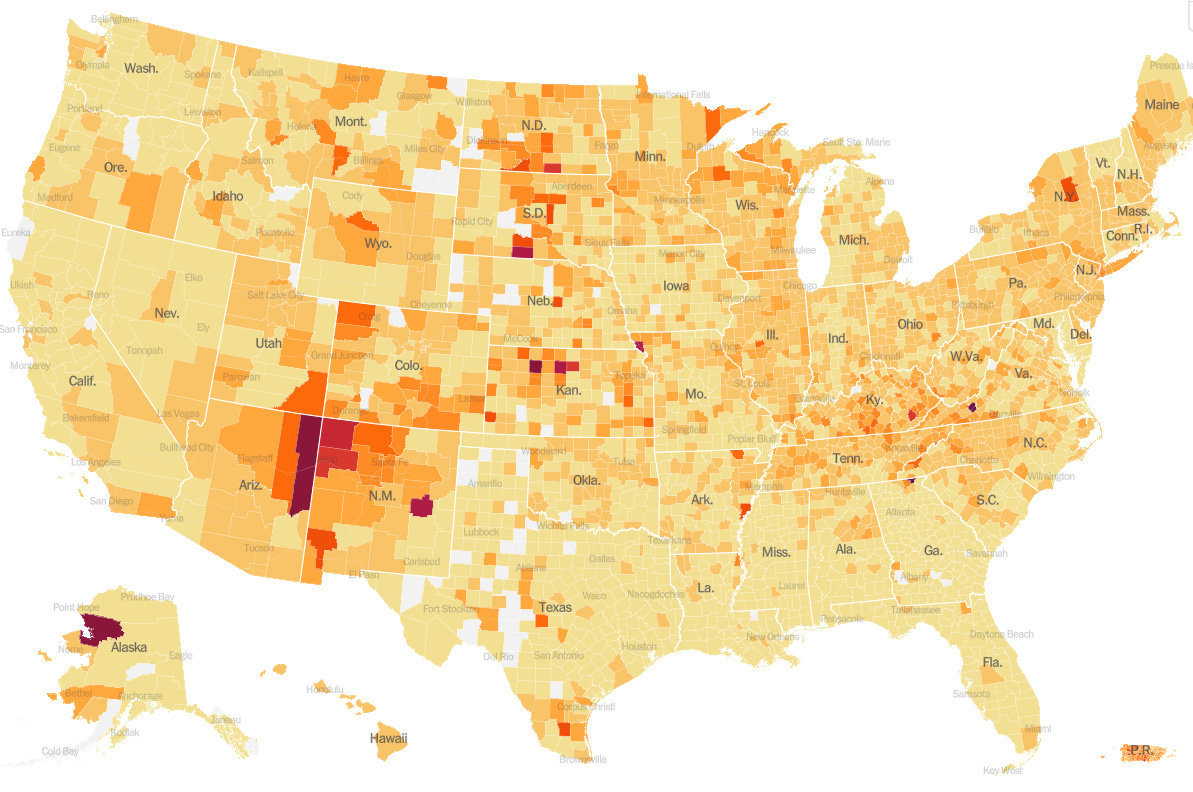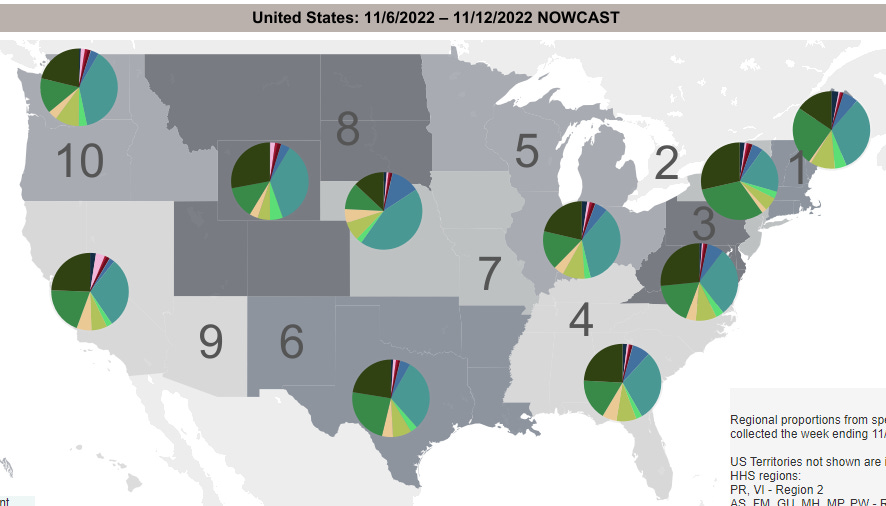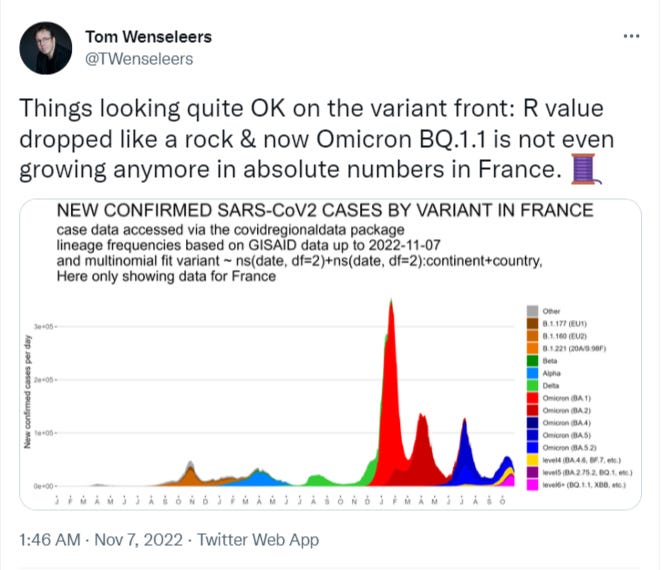COVID news 11/11/22
Hi all,
This week, I wanted to start with some good news. Researchers in Switzerland have used spatiotemporal epidural electrical stimulation (EES) of the lumbar spinal cord, applied during neurorehabilitation. This restored walking ability in nine individuals paralyzed from spinal cord injury.
Remember to get your flu shots as soon as possible because influenza cases and hospitalizations are unusually high for this time of year. In fact, the CDC had to make a new category on their map (purple color) to represent this unprecedented high number of cases.
RSV cases in young babies are very high at this time which is also unusually early. Many pediatric ICUs are full. Fortunately, Pfizer’s Phase 3 trial data shows that giving their new RSV vaccine to pregnant patients before they give birth, protects the newborn baby with an efficacy of 82% for newborns in their first 90 days and 69% up to 6 months of age.
Young babies under age 6 months are being hospitalized at a much higher rate for COVID infection now. The CDC recommends that all pregnant people be vaccinated or boosted against COVID during pregnancy to protect the baby after birth. This is especially important because a new study this week shows that in pregnancy, vaccination increases neutralizing antibodies by ten-fold as compared to antibodies made from COVID infections.
Unfortunately, only 5% of all people in the 24 to 49 year old age group have gotten the bivalent booster. We need to try to improve this especially because the new bivalent boosters have been shown to protect better against the new subvariants like BQ.1.(1).
BQ.1.(1) now represents 44% of cases in the United States now. France is the bellwether for BQ.1.(1) as it is the first country to have it be the dominant variant. Luckily, it appears that cases of BQ.1.1 in France are going down as are hospitalizations. So hopefully, BQ.1.1 won’t cause as many problems here as we first worried because of its immune evasiveness noted in lab studies. New York State has the highest percent of BQ.1.(1) in the U.S. and so far their hospitalizations have not increased significantly. The bivalent booster appears to help protect better against the new subvariants like BQ.1.(1), so it is important for people to get them if they haven’t already.
A new article from the Veterans Administration shows that reinfections with COVID are not benign. COVID reinfections (i.e. having had more than one COVID infection) were found to be associated with increased risk of death and hospitalizations as well as significantly elevated risks of cardiac problems and blood clots. Being reinfected with COVID also increases the risk of Long COVID. Many people have gone back to life as normal, but it seems wise to protect ourselves against reinfections with COVID with the bivalent boosters, masks indoors when cases increase, better ventilation and testing when we feel sick until we can get nasal vaccines or other better protections.
Two authors this week reviewed mechanisms that may be causing cognitive deficits in Long COVID such as brain fog patients after mild respiratory COVID infections. SARS-CoV-2 virus does not cross into the brain, however a mild infection in the lungs causes the release of cytokines into the blood. The cytokines go across into the brain and cause neuroinflammation. CCL11 activates microglia in the hippocampus which is related to memory and the subcortical white matter in the brain. The activated microglia cause loss of neurogenesis in the hippocampus and breakdown of myelin insulating nerves. CCL11 may be a biomarker for brain fog. There is an FDA approved drug (Pexidartinib) that potentially could be repurposed to control microglial activation and damage in the brain.
Finally, a study this week shows that Paxlovid given during acute infection decreases future Long COVID by 26% regardless of vaccination status. Paxlovid also decreased the risk of death, hospitalizations, and other major COVID complications.
Have a good weekend,
Ruth Ann Crystal MD
Twitter: https://twitter.com/CatchTheBaby
Other news:
11/9/22 Nature: The neurons that restore walking after paralysis https://buff.ly/3WL9DUX
Restoration of walking capability in 9 patients with spinal cord injury.
We thus identified a recovery-organizing neuronal subpopulation that is necessary and sufficient to regain walking after paralysis.
11/9/22 NEJM: In Utero Enzyme-Replacement Therapy for Infantile-Onset Pompe’s Disease https://buff.ly/3NSOhAQ
A triumph of successful in utero (fetal) treatment of Pompe's disease, a rare fatal genetic condition.
The family had 2 prior children who died of infantile-onset Pompe’s disease with cardiomyopathy.
After receiving in utero enzyme-replacement therapy (ERT) and standard postnatal therapy, the current patient had normal cardiac and age-appropriate motor function postnatally, was meeting developmental milestones, had normal biomarker levels, and was feeding and growing well at 13 months of age.
11/9/22 Very Well Family: Promising Pfizer RSV Vaccine for Pregnancy May Protect Newborns https://buff.ly/3G0wC8n
Pfizer’s Phase 3 trial data shows that giving their new RSV vaccine to pregnant patients before they give birth, protects the newborn baby with an efficacy of 81.8% for newborns in their first 90 days and VE remains high at 69.4% up to 6 months.
FLU is starting much earlier this year (see red triangles): https://www.cdc.gov/flu/weekly/index.htm
11/4/22 AP: US flu season off to a fast start as other viruses spread https://buff.ly/3TiKZIk
Reports of flu are already high in 17 states, and the hospitalization rate hasn’t been this high this early since the 2009 swine flu pandemic, according to the” CDC.
COVID News:
https://newsnodes.com/worldmonitor/
World
United States
https://www.nytimes.com/interactive/2021/us/covid-cases.html
US cases:
https://ourworldindata.org/coronavirus
France has high BQ.1.1 and the cases are going down as are the hospitalizations
Variant tracker in US: https://covid.cdc.gov/covid-data-tracker/#variant-proportions
Gerstung-lab: International SARS-CoV-2 Variant surveillance https://buff.ly/3FbG3Bz
Wastewater Monitoring:
CDC Wastewater Monitor https://covid.cdc.gov/covid-data-tracker/#wastewater-surveillance
Biobot: https://biobot.io/data/
Bay Area: Sewer Coronavirus Alert Network (SCAN) project by Stanford University:
Eric Topol MD is writing daily updates on COVID at
Dr.Verduzco-Gutierrez on the cost of Long COVID:
11/10/22 Nature: Acute and postacute sequelae (PASC/Long COVID) associated with SARS-CoV-2 reinfection https://buff.ly/3hyZp9R
In this study of 5.8 million people from the V.A.
444k with only 1 COVID infection (no reinfection), 41k with reinfection and 5.3 million non-infected controls.
Compared to no reinfection, reinfection increased risk of death, hospitalization, and other adverse health outcomes (heart problems and blood clots).
People with reinfection had
2x increased risk of death
3x increased risk of hospitalization
3x increased risk of heart problems
3x increased risk of blood clotting
Reinfection also increased risk of
Diabetes
Fatigue
Kidney problems
Mental health disorders
Musculoskeletal problems
Neurologic disorders
Lung problems
Reinfection increased the risks of death, hospitalization and organ injury in the acute and post-acute phase and the elevated risks remained evident at 6 months after reinfection.
Reinfection increases the risk of acute and Long Covid.
Reinfections are not benign and will continue to happen until we have vaccines that block transmission, offer durable protection and are variant proof.
We also need prevention and treatment strategies for Long Covid.
11/10/22 PLOS: Post-COVID-19-associated morbidity in children, adolescents, and adults: A matched cohort study including more than 157,000 individuals with COVID-19 in Germany https://buff.ly/3TybBoB
German retrospective matched cohort Long Covid study of 157,000 people with Covid, including about 12,000 children and adolescents.
There was significant new onset morbidity in children, adolescents, and adults across 13 prespecified diagnosis/symptom complexes, following COVID-19 infection.
"The results of the present study indicate that post-Covid-19 (PASC, Long COVID) cannot be dismissed among children and adolescents."
10/17/22 JAHA: Prior SARS‐CoV‐2 Infection Is Associated With Coronary Vasomotor Dysfunction as Assessed by Coronary Flow Reserve From Cardiac Positron Emission Tomography https://buff.ly/3UnpWWg
Researchers identified patients getting a myocardial stress perfusion PET if they had a prior COVID infection (positive PCR) or not.
On average, COVID patients had their infection 4.6 months prior to the test.
47% of COVID patients in this study had been hospitalized for COVID previously.
Myocardial blood flow reserve was abnormal in 44.0% of the patients with prior COVID‐19 compared with 11.7% of matched controls (P<0.001).
The mean myocardial blood flow reserve was 19.4% lower in patients with prior COVID‐19 compared with control patients.
When compared with a matched control group without prior COVID-19 within a similar time frame, patients with prior COVID-19 had greater frequency and severity of coronary vasomotor dysfunction with lower maximal myocardial blood flow and myocardial blood flow reserve.
Myocardial blood flow reserve was impaired in patients with prior COVID‐19 infection compared with cardiovascular risk factor–matched controls, suggesting a relationship between SARS‐CoV‐2 infection and coronary vascular health.
These data highlight the need to assess long‐term consequences of COVID‐19 on vascular health in future prospective studies.
11/10/22 Eric Topol MD: Summary of Cognitive deficits in Long COVID (regarding the 3 articles below) https://buff.ly/3G5iU4g
[The article below] is a mechanistic review of what we know about brain fog after a mild covid infection. It’s a recap of a paper published in June using a mouse model and recapitulated in a small group of patients. Neuroinflammation was induced and while there was no evidence of direct virus infection, the microglia was activated in brain white matter, with subsequent loss of myelin. The inflammation seen in the hippocampus may explain the clinical symptoms of memory impairment. A biomarker of inflammation—CCL11—was increased in the model and in patients suffering Long Covid with brain fog. It should be considered a candidate to track the process along with potential therapies, such as targeting microglial activation— well worth a clinical trial. There is an FDA approved drug (Pexidartinib) that potentially could be repurposed for such a tri
11/9/22 NEJM: Cognitive Deficits in Long Covid-19 https://buff.ly/3UpCVqA
Mechanisms of Brain Fog in Long COVID.
Authors review the mouse study by Fernández-Castañeda et al. below.
CCL11 activates microglia in the brain (in subcortical and hippocampal white matter) which may be a cause of brain fog after mild COVID infections.
Microglia are resident macrophages in the CNS.
CCL11 may be a biomarker.
We need large studies in humans with possible microglial modulators (Pexidartinib, some NSAIDs, Tetracyclines) to see if this can treat COVID related brain fog.
Findings from the study by Fernández-Castañeda and colleagues support the testing of microglial modulators (Pexidartinib, some NSAIDs and Tetracyclines) to treat Covid-related brain fog.
7/7/22 Fernández-Castañeda et al: Mild respiratory COVID can cause multi-lineage neural cell and myelin dysregulation https://buff.ly/3TuHX3L
Used a mouse model which showed mild respiratory COVID causes prominent neuroinflammation.
Summary:
Respiratory COVID induces CSF cytokine elevation and microglial reactivity
CCL11 activates hippocampal microglia and impairs neurogenesis
Respiratory COVID causes persistent loss of oligodendrocytes and myelinated axons
Respiratory influenza causes similar but less persistent cellular dysregulation
Another article on the Fernandez-Castaneda article from June:
6/14/22 Cell: COVID brain fog demystified https://buff.ly/3TuwmBR
Chemobrain and COVID brain fog both have elevations in neurotoxic cytokines and reactive microglia (brain-resident macrophages) lead to cascades of multicellular events that impact forms of both gray and white matter plasticity that are important for healthy cognition.
CCL11 remained persistently elevated in mouse cerebrospinal fluid 7 weeks post SARS-CoV-2 infection.
11/10/22 Bloomberg: Covid Hospitalizations Are Rising in Kids Under 6 Months, CDC Urges Pregnant Mothers To Be Vaccinated https://buff.ly/3G5eQB9
Pregnant people who are vaccinated can pass antibodies to their babies.
Only 5% of all people ages 24 to 49 have gotten the bivalent booster.
11/9/22 JAMA: Comparison of Maternal and Neonatal Antibody Levels After Vaccination vs Infection https://buff.ly/3A2f6wF
In pregnancy, a 10-fold higher SARS-CoV-2 antibody from vaccine compared with Covid infections with enhanced protection for the newborn. -ET
Maternal and cord blood IgG antibody levels were higher after COVID-19 vaccination compared with after SARS-CoV-2 infection, with slightly lower placental transfer ratios after vaccination than after infection.
The findings suggest that time from infection or vaccination to delivery was the most important factor in placental transfer efficiency.
Placental antibody transfer was detectable as early as 26 weeks’ gestation.
Transfer ratio that was higher than 1.0 was present for 48 of 51 (94.1%) births at 36 weeks’ gestation or later by 8 weeks after vaccination.
11/9/22 Immunity: Innate immune mechanisms of mRNA vaccines https://buff.ly/3WMKTLX
Review of mRNA vaccines.
Potential to alter the mRNA-nanoparticle platform to improve delivery efficiency, durability of efficacy, and reduce the side-effects (reactogenicity).
11/9/22 Med Page Today: FDA Authorizes IL-1 Drug for Hospitalized COVID Patients https://buff.ly/3G6r0cM
Anakinra (Kineret) is indicated for patients with pneumonia who are at risk of severe respiratory failure. It is an interleukin-1 receptor antagonist (IL-1Ra).
11/9/22 NEJM: Six-Month Follow-up after a Fourth BNT162b2 Vaccine Dose https://buff.ly/3A66Fk7
The 4th monovalent shot (2nd booster) induced a good, sustained neutralizing antibody response but its protection against infection lasted only about 3 months which was less than the 3rd shot.
11/7/22 WSJ: Long COVID: Covid’s Drag on the Workforce Proves Persistent. ‘It Sets Us Back.’ https://buff.ly/3UGnJFd
Via Eric Topol
The Virus is still keeping millions out of work while reducing productivity and hours of millions more, disrupting business operations and raising costs.
The impact of Long Covid (PASC) on the American workforce
Persistent loss of ~500,000 workers
"A mass disabling event"
BQ.1.1 in France:
BQ.1.1 cases and hospitalizations are decreasing in France probably from their immunity wall from prior infections and vaccinations and boosters.
The new bivalent booster also causes some protection against BQ.1.1 and BA.2.75.2 which may also be helping.
But, of note, French school children have been on vacation for 2 weeks and also non-hospital labs were on strike for 5 days last week in France which may affect case numbers.
11/7/22
11/7/22 PNAS: Protective down-regulated states in the human brain: A possible lesson from COVID-19 https://buff.ly/3UrQ9Ty
Patients hospitalized with COVID-19 who recovered and were taken off ventilators and anesthesia that “took weeks, and sometimes months, to wake up. But then they usually regained full consciousness, with no sign of brain damage.”
The “brains of unconscious” patients with COVID-19 “bear a striking resemblance to those of turtles that spend the winter encased in ice.
Turtles “survive by putting their neurons into an unusual quiet state that lasts for months,” and the researchers “believe that the combination of COVID and sedatives prompts a similar response in people.”
11/6/22 MedRxiV (Ziyad Al-Aly): Nirmatrelvir (Paxlovid) and the Risk of Post-Acute Sequelae of COVID-19 (PASC or Long COVID) https://buff.ly/3WBe2d2
March 2022 to June 2022 (Omicron). 9000 treated with Paxlovid compared to 47,000 patients that were not.
The mean age of the participants in this study at the V.A. was 65 and only 12% female. Fewer participants were < age 60.
In people with SARS-CoV-2 infection who had at least 1 risk factor for progression to severe COVID-19, Paxlovid use in the acute phase (within 5 days of positive test) was associated with reduced risk of Long Covid (by 26%) regardless of vaccination status and history of prior infection.
Paxlovid treatment of acute infection also led to further reduction of deaths, hospitalizations, and many complications of Covid over the extended 90 day follow-up time.
The further decrease of deaths and hospitalizations after the acute phase is notable.
No difference in Paxlovid benefit by vaccination status, patient sex, patient age (the benefit for patients less than age 60 was the same as patients age 70+).
11/5/22 Obstetrics & Gynecology Green J: Coronavirus Disease 2019 (COVID-19)–Related Stress and Menstrual Changes https://buff.ly/3A6vSLf
High COVID-19–related stress is associated with significant changes in menstrual cycle length, alterations in period duration, and increased intermenstrual spotting as compared with before the pandemic.
Given that menstrual health is frequently an indicator of women's overall well-being, clinicians, researchers, and public health officials must consider the association between COVID-19–related stress and menstrual disturbances.
11/5/22 BMJ: Association between regular physical activity and the protective effect of vaccination against SARS-CoV-2 in a South African case–control study https://buff.ly/3WMSE4D
Exercising regularly may improve the effectiveness of COVID-19 vaccine.























